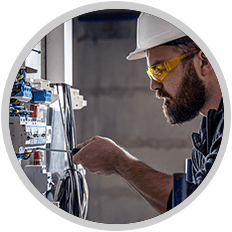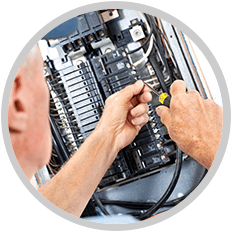Free 12 Point Electrical Safety Inspection
The JRE Proven Process
Experience the Highest Rated & Most Reviewed Electrician in Gulf Shores, AL
Free Consultation
Initial Assessment / Walkthrough
Accurate Estimate / Proposal
Schedule Job
Complete Job
Frequently Asks Questions
What locations does J Robinson Electric LLC, serve?
We are licensed to work anywhere in the State of Alabama as an electrician Gulf Shores AL can trust, but we generally focus on Baldwin and Mobile Counties with our home base being in Gulf Shores.
What are your normal business hours?
We try to keep our working hours between 7:00-3:30 Monday through Friday, however if you have an electrician Gulf Shores AL emergency, we will do our best to help.
What types of work do you do?
The electrical trade deals with a wide variety of tools, materials, and technical skills. Our electrician Gulf Shores AL team has a vast range of knowledge and experience with all of these areas.
Our specialities include the following:
- Residential
- Commercial
- Industrial
- Fire Alarm Installations
- Service Calls
Is J Robinson Electric LLC, Licensed and Insured?
Yes. We have an Alabama State Electrical License, a General Contractors License, and are Licensed in Baldwin and Mobile Counties, including the municipalities located within.
We carry and verify, upon request, General Liability and Workers Comp Insurance that meets or exceeds industry standards as an electrician Gulf Shores AL you can trust.
What types of payments do you accept?
We accept cash, checks, and all major credit cards.
Do you offer a warranty on materials and installations?
Yes. We offer a 1 year warranty on all labor and materials. We use high quality materials and expert craftsmanship. Our work and materials used should last for years, but if for some reason you have trouble, within the year, we will replace any defective parts.
Do you give free estimates?
Yes. We understand many of our customers are on a tight budget. Upon request, we will give a free estimate and a full explanation of work necessary, and will not begin work without your approval.
I lost power to a plug, appliance, or light, in my house. What do I do now?
You may have a tripped breaker. These breakers are usually located in electrical panels on the outside wall of the home, or inside, possibly in a utility room or garage.
What will cause a breaker to trip?
Circuit breakers are installed for your protection. There are times when breakers seem to trip for no reason. Anytime a breaker trips, it is always recommended you contact a qualified electrician to find the source of the problem. Most of the time, a tripped breaker is a sign of an electrical fault. The breaker is designed to open, or trip, when these faults occur to prevent damage to appliances, or stop other problems that could lead to housefires.
I have a tripped breaker at my home, what should I do?
There are things a homeowner can do to try to remedy the problem themselves. However, only do this if you feel comfortable doing so. Working in or on home electrical panels can cause more damage to the electrical system, injury to you or your family, or in extreme cases death.
- Look around the room or rooms where power is off. Look for things that could be the cause for the tripped breaker. Are there too many cords plugged into this circuit? Damaged cords or tools?
- While looking, also smell the area for smoke. If you notice any smoke or smell anything strange you should call help immediately.
- Look for a tripped breaker. Be careful when opening outside panels, they are known for making a good home for spiders or bees/wasps. A tripped breaker usually appears to be in the middle position, that is neither off or on. A panel that has been labeled correctly helps a lot in this situation. If your panels are not properly labeled we can help with that too.
- After thoroughly checking for potential problems, if you still feel comfortable doing so, you can try to reset the tripped breaker. To reset the breaker, you must first flip the breaker to the off position, then flip to the on position. If the breaker trips again, flip the breaker to the off position and call a qualified electrician as soon as possible.
Why do I lose power to my kitchen or bathroom plugs?
- Kitchen and Bathroom plugs should be GFCI or Ground Fault Circuit Interrupter protected. These can be GFCI outlets or GFCI breakers. Regular plugs can be connected to GFCI plugs or to GFCI breakers so they can also be protected.
- To reset a GFCI plug, look for a plug with buttons. Usually they have the words “Trip” and “Reset” imprinted on them. Press the “Reset” button. If the GFCI plug will not reset, you should call an electrician.
- If you have GFCI breakers, locate the correct breaker and reset it by moving the handle to the OFF position first, then to the ON position. If the breaker trips again, leave it in the OFF position, and call an electrician.
How do I pick the right LED bulbs?
Terms used to rate light bulbs:
- Watts:
- The amount of energy a bulb uses. The power company uses Watts to calculate our power consumption. The more Watts we use, the higher our power bill will be.
- Lumens:
- The amount of light emitted from a light bulb. More Lumens = More Light
- Light Color:
- LED light color is measured by Kelvin (K) temperature. Lower temperature numbers will have a more yellow light. Higher temperature numbers will have a brighter white to blue light.
- Soft White – 2700K – 3000K
- Warm White – 3000K – 4000K
- Bright White – 4000K – 5000K
- Daylight – 5000K – 6500K
- LED light color is measured by Kelvin (K) temperature. Lower temperature numbers will have a more yellow light. Higher temperature numbers will have a brighter white to blue light.
How can I safely connect a generator to my house?
Hurricanes are a part of life here on the Gulf Coast. Most of us have experienced power outages, some that last several days, due to Hurricane damage. There are many different ways to connect a generator to your house. The only safe way is with a Transfer Switch. A Transfer Switch works by only allowing power to travel from 1 source at a time to the house. This is very important because it allows you to feed power from your generator to your house without the danger of back-feeding to power lines while workers are present.
There are different types of Transfer Switches. Manual switches have to be switched Manually by a disconnect handle. The handle can be switched from Commercial Power to OFF to Generator Power, allowing only 1 source at a time. Automatic Transfer Switches are designed to sense an outage of commercial power and automatically switch to Generator power. Some ATS’s can make this switch within seconds of a power outage.
Generlink Brand Transfer switches are a good choice for people who would like to safely connect a small portable generator to their whole house.
We can help you decide what generator and transfer switch is right for your home.





 Free Consultation
Free Consultation  Initial Assessment / Walkthrough
Initial Assessment / Walkthrough Accurate Estimate / Proposal
Accurate Estimate / Proposal Schedule Job
Schedule Job Complete Job
Complete Job